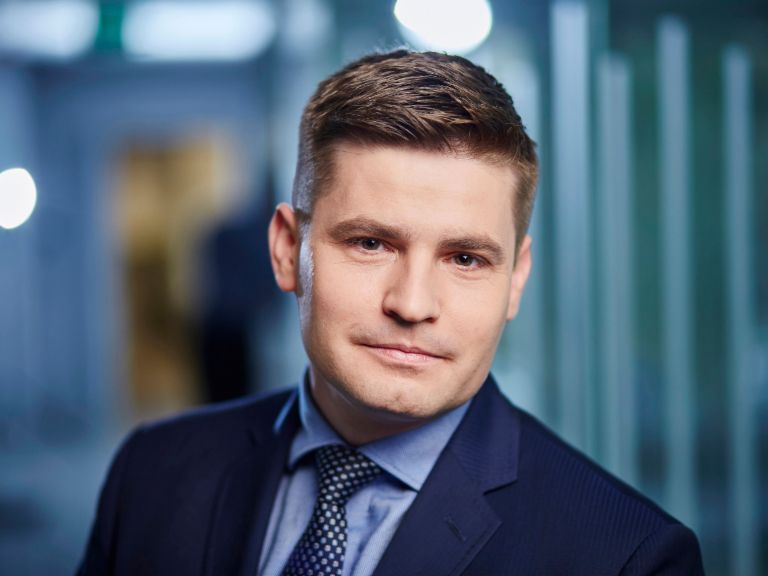Sale of receivables: Values count more than prices.
If a competitor is out in front, there are two ways to react: keep up at any price. Or remain level-headed and focus on our own strengths. In Poland, EOS learned how it can be advisable to choose option two.
- When purchasing receivables in Poland, a competitor outbid EOS time and again.
- After a while, it emerged that there was probably something not quite right with the inflated prices.
Missed again. A competitor outbid EOS again and won the tender for a portfolio of non-performing loans (NPL). This can happen no matter how well you do your job. But in 2016 and 2017 it kept happening. “At some point, we realized even before we had submitted an offer that we wouldn’t win the portfolio anyway,” tells Dariusz Petynka, Managing Director of EOS in Poland. And the winner was usually GetBack. The competitor simply offered significantly higher prices. Which raised the question as to how far a company should go if it wants to win. Is the pursuit of success justified at any cost?

Sale of receivables: It's different when you're spending your own money.
It was highly tempting to answer this question with “yes”. Especially in Poland. “A large new market is just emerging here,” says Petynka. “For a long time, receivables sales were not common in Poland. But that is changing.” The buyers interested in these kinds of portfolios are collection agencies. They look at the results from previous sales and calculate the probability of whether, when and how much a customer will pay. The profit is in the difference between the calculated result and the price the collection agency pays for the portfolio.
But it has been said that GetBack was always an average of 30 percent above our offers. What were we to do? “We were sure that they would have to fail sooner or later with these prices,” says Petynka. Nevertheless, the EOS team began to wonder. “We asked ourselves, are we being too conservative in our calculations?” says David Müller, who takes care of the Eastern European business at the EOS headquarters in Hamburg. “Can we improve our operational business? Should we forgo our margins?” In the end, the answer to all these questions was a resounding “no”.
Returns? Yes – but not at any risk.
Instead, we refocused on what sets EOS apart from its competitors. This begins with capital resources. Many competitors are investment companies that collect money for investors. “But we belong to the Otto Group, so we’re a family-run company. This is a huge difference,” says Müller.
The international structure means that we can afford this quiet phase, says Petynka: “If business is not going so well in one country, it is doing better in another country.” Our approach to choosing the portfolios is also different to that of some competitors. “We do not buy any debts that are subject to agreements which may not have a legitimate basis,” says Müller.
One reason for this is the risk that the debt cannot be monetized. Another is ethics. “We see it as our task to help defaulting payers to reduce their debts,” says Müller. “In the end, the value that stands above all others at EOS is the reputation of the Otto Group.”
Of course we also want to generate returns but we think more in the long term and do not take every risk. After all, it is our own money that we are spending.

Focus on niche sectors and secured NPLs.
As a consequence, there was a clear path to take in Poland: withdrawal. EOS no longer bid on the large NPL portfolios of Polish banks. Instead, the company concentrated on niche sectors. Small portfolios that did not come from banks, but from energy companies or once, even a brewery. “They were so small that many of our large competitors were not even interested,” says Müller. And EOS focused increasingly on a particular type of non-performing loans – secured NPL. “Since then, sales in this area have been increasing steadily,” says Petynka.
Meanwhile, something else collapsed: the competitor’s supposed model of success. At the beginning of 2018, there were allegations that the company had forged or manipulated documents. Several members of staff were arrested, including one of the former managing directors. The result: after the collapse, hardly any investors wanted to invest in debt recovery funds or buy debt packages.
“The market is therefore open for EOS,” says Müller. “We are once again in full swing with unsecured receivables.” However, secured loans now make up the greatest share of new business. A lesson from the GetBack experience, says Müller. “We must always have an eye out for new opportunities and business areas.”
After all, what happened in Poland can clearly happen again. “We see time and again how companies invest million-euro sums and we ask ourselves how they ever want to make reasonable returns.” Therefore, it is also clear that many will fail. And that wanting to keep up is not always worth it. Not at any price.
Photo Credits: EOS / Dariusz Iwanski, Getty Images / Caiaimage / Agnieszka Olek, Getty Images / Kanchana Chitkhamma / EyeEm, Collection
